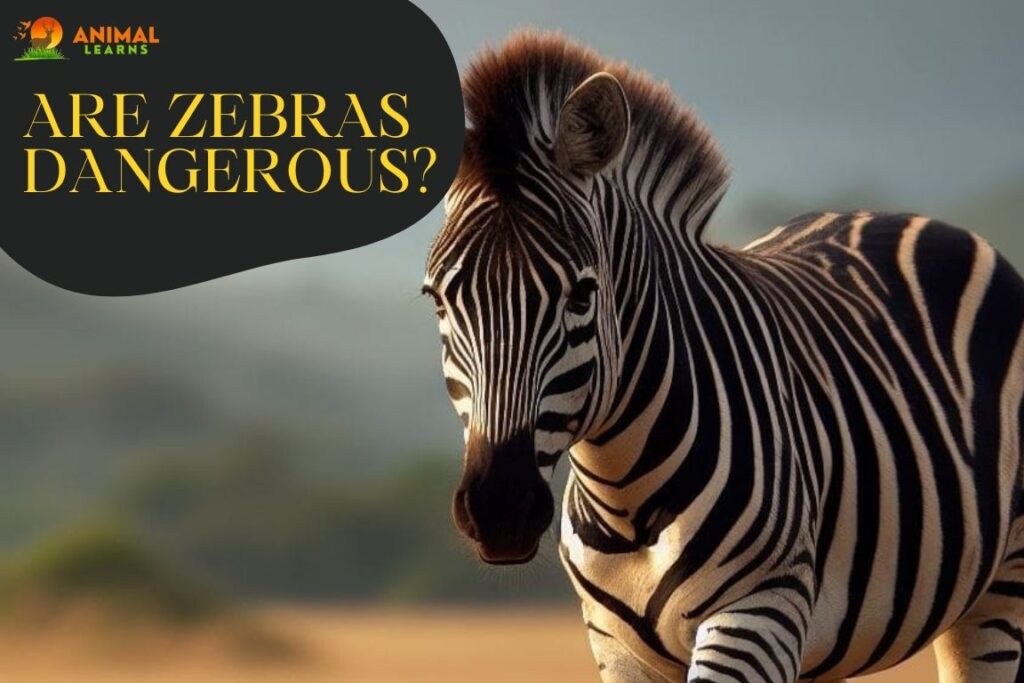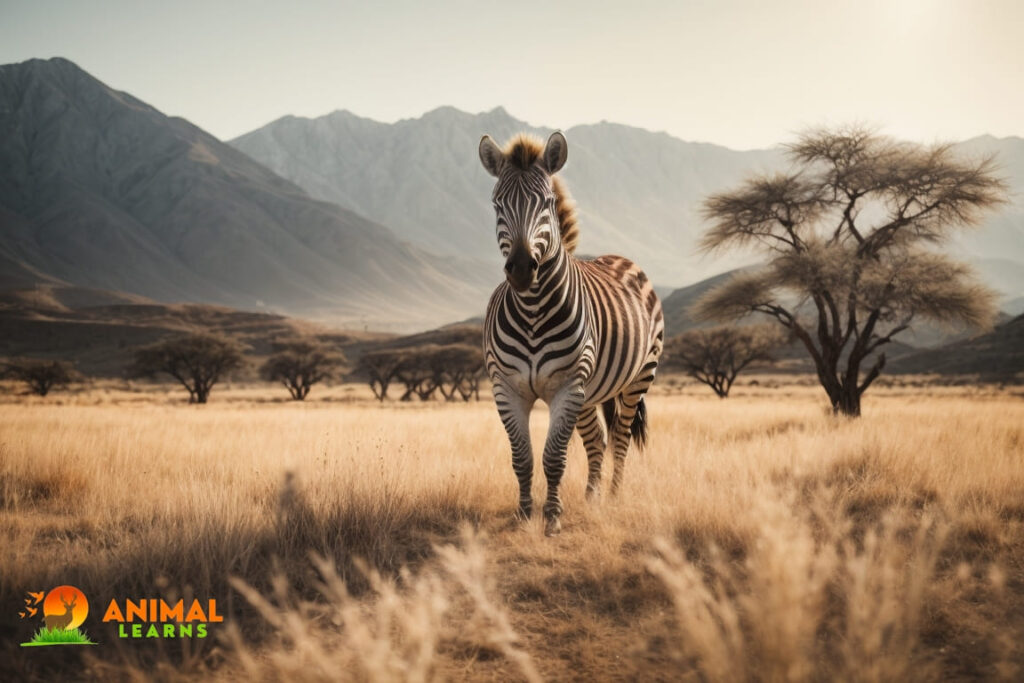Are Zebras Dangerous? Discover the Reality

| Information | Zebra |
|---|---|
| Scientific Name | Equus zebra |
| Size | Varies by species; typically 4.6 to 5.6 feet (1.4-1.7 meters) at the shoulder |
| Weight | Varies by species; typically 440 to 990 pounds (200-450 kg) |
| Running Speed | Around 40-65 km/h (25-40 mph) |
| Location | Native to Africa; found in various regions of the continent, including savannas, grasslands, and woodlands |
| Diet | Herbivorous; primarily graze on grasses, but also eat leaves, shrubs, and bark |
Are Zebras Dangerous? Respect and Caution Are Key. Zebras, while not usually aggressive, may defend themselves if provoked. Before delving into the mysterious world of zebras, it is necessary to get some background knowledge on these intriguing animals.
Africa’s varied terrain is home to zebras, who are distinguished by their characteristic black and white stripes. However, the issue of “Are zebras dangerous?” comes up frequently.
The complexity of these animals—which may be both fascinating and sometimes unpredictable—explains why studying their habitat is an engrossing and thought-provoking experience.
Are Zebras Dangerous
Contents
Though fascinating animals, are zebras actually dangerous? Even while they are not as dangerous as apex predators like lions or crocodiles, zebras can act aggressively, particularly if they feel cornered or threatened.
Zebras are capable of self-defense thanks to their strong hooves and keen teeth. But generally speaking, they aren’t thought to pose a significant risk to people. For any encounter with zebras to be safe and pleasurable, you must approach them cautiously, respect their space, and avoid upsetting them.
Do Zebras Bite?
Indeed, zebras have the ability to bite when provoked or threatened. Zebras are wild animals with an innate desire to protect themselves when they sense danger, despite their placid herbivorous lifestyle.
When seeing or interacting with zebras in the wild or in captivity, it’s imperative to use caution and keep a safe distance in order to prevent any potential bites or aggressive behavior.
In order to protect zebras and people alike, it is imperative that both parties treat animals with respect and behave responsibly while interacting with them.
Are Zebras Aggressive?

Although zebras are not normally violent creatures, when they sense danger or are trapped, they may act defensively. Rather than act aggressively, their natural impulse is to run from prospective attackers.
Zebras should, however, be treated with respect and caution in their native environment, just like any other wild animal. It’s critical to keep a safe distance from them and avoid upsetting or bothering them in order to avoid any unanticipated reactions.
Although they are not naturally hostile, the best way to guarantee a peaceful cohabitation with these amazing creatures is to respect their space and observe them from a distance.
Are Zebras Dangerous to Humans?
Are zebras dangerous to approach? It’s crucial to maintain a safe distance from these animals in the wild, as they can react defensively if humans get too close. Evaluating the possible dangers posed by zebras can be difficult.
Even though zebras aren’t usually renowned for being hostile, there have been instances and meetings in the real world that show how dangerous they can be. These instances frequently happen when people try to approach them too closely or invade their area.
Studies and expert comments on zebra behavior provide insight into the elements that lead to these kinds of interactions. According to some scientists, zebras may become aggressive toward people because of their territorial instincts and propensity to defend their young. This takes us to the current controversy: “Are Zebras Safe?” vs. “Zebras are Dangerous?”
Why Are Zebras So Dangerous?
- Zebras have a territorial instinct; this is especially true in locations with few resources. They use this territorial behavior as a defensive strategy to keep their food and water supplies safe.
- Like many other animals, zebras are capable of protecting their young. If a mother zebra feels that her foal is in danger, she may act aggressively.
- Zebras are renowned for having a strong herding instinct. When confronted, they may look more hostile because, as a group, they may respond in concert to repel perceived threats.
- Zebras may defend themselves by using their strong hind legs and keen teeth for kicking and biting. They may bite or kick to defend themselves if they feel cornered or threatened.
- Zebras may become more violent when they are in captivity or under stress. Confrontational reactions can be triggered by stress, provocation, or abuse.
Are Zebras More Dangerous than Lions?

The threat posed by zebras to lions is equal. As apex predators, lions pose a far greater threat to zebras than they do to the latter. Zebras are herbivores that mostly eat grass and other plants. Because of their speed, agility, and sense of group safety, they have built-in defenses against predators.
As carnivorous predators, lions are known to hunt zebras among other animals in order to provide for their own needs. Lions are extremely successful predators because of their sharp teeth, strong jaws, and social structure, which enables them to plan coordinated hunts.
Are Zebras Friendly to Humans?
Zebras typically maintain a cautious distance from humans, fueling concerns about “are zebras dangerous” or friendly to our species. Even though they are fascinating and compelling animals, zebras are not often thought to be very amiable toward people.
These creatures are innately wild and naturally wary of people. Zebras may be erratic in the wild and may view people as possible dangers. Zebras kept in captivity or in nature reserves, for example, may, in certain cases, show more tolerance for human presence in regulated situations.
It’s important to keep in mind that, even in these situations, zebra and human safety should be prioritized, and caution and respect for the animals should be shown. Because zebras are wild creatures, handling them should always be done with responsibility.
Is It Safe To Ride Zebras?
No, riding zebras is not safe. Zebras are not appropriate for riding since they are wild animals with frequently hostile and unpredictable behavior. Zebras have not been bred or trained for human contact or riding, in contrast to domesticated horses. Both the rider and the zebra may get injuries if one attempts to mount one of these animals.
Furthermore, rather than trying to ride these extraordinary animals, it is crucial to put their welfare and protection first by seeing them in their native environment or in a respectable and ethical wildlife refuge.
are zebras endangered
At the moment, zebras are not considered endangered. In reality, when it comes to their conservation status, zebras as a species are usually regarded as least concerning. This indicates that there are no current risks to their extinction and that their numbers are generally steady.
It’s crucial to remember, though, that some zebra species—like the mountain and Grevy’s zebras—have experienced difficulties and are categorized as vulnerable or endangered in some areas as a result of habitat loss and poaching. To preserve and safeguard the existence of these more vulnerable species, conservation initiatives have been put in place.
Can Zebras Be Tamed Or Domesticated?

While there is debate about the possibility of taming zebras, one thing is clear: are zebras dangerous due to their unpredictable nature. Zebras have a well-deserved reputation for being wild and erratic. Zebras are very difficult to tame and domesticate, in contrast to horses, who have been successfully tamed for years.
It is very difficult to create the same degree of confidence and control over them as is attainable with domesticated horses because of their strong instincts for self-preservation, territorial behavior, and innate wariness of humans.
Although there have been a few isolated reports of tamed or semi-domesticated zebras, they remain the exception rather than the rule. Zebras are best enjoyed and seen in their natural habitat or in conservation settings; they are generally not thought to be appropriate for traditional domestication or as working animals like horses.
FAQs
Are zebras dangerous to humans?
Yes, zebras can be dangerous to humans. While they may appear docile, they have been known to exhibit aggressive behaviors, such as biting and kicking, especially when they feel threatened or cornered.
Why are zebras considered dangerous?
Zebras are considered dangerous due to their unpredictable nature, strong territorial instincts, and powerful hooves. In the wild, they can be defensive when protecting their territory or young.
Are zebras more dangerous than lions?
No, zebras are not more dangerous than lions. Lions are apex predators with a much higher potential to pose a threat to humans. Zebras, though potentially dangerous, are not in the same league as lions when it comes to posing a direct danger.
Can zebras be tamed or domesticated?
Zebras are not easily tamed or domesticated. They have not undergone the same selective breeding and training as horses, and their wild instincts remain strong, making them challenging to train for human use.
How can people safely observe zebras in the wild?
To safely observe zebras in their natural habitat, it’s best to maintain a safe distance and avoid any sudden or threatening movements. Joining guided wildlife safaris or tours conducted by experts is a responsible and secure way to enjoy zebra encounters.












